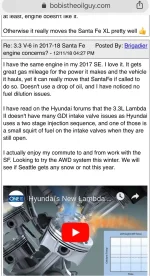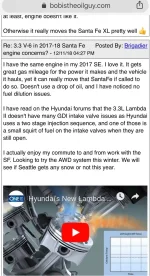j4ypal
New member
- Joined
- Jun 12, 2018
- Messages
- 10
- Reaction score
- 4
- Points
- 3
- Genesis Model Type
- No Genesis Yet!
Like many others, I am waiting for th new entries from Genesis (G80 and GV80), possibly for the 2020 model year. But the carbon build up problems that plague almost all GDI / DI engines have me a bit turned off.
I've read on another forum that the Lambda II engine integrates two stage injection, which would solve the carbon build up problem. BUT I have only read that in one post (see image). Nothing else corroborates this theory. Does anybody else have info in that regard?
Source: see thread here.
Other than that, I hope the new Lambda III engine integrates a solution to the carbon problem. Rumors say it's a 3.5L twin turbo: Genesis G80 to Debut in September in South Korea - Korean Car Blog
This source does not talk about anything in regards to the lambda II engine: 3.3L Engine (Lambda MPI/GDI/T-GDI) Specifications And Review on MotorReviewer.com
The twin turbo Lambda II engine code is: G6DP according to their info.

I've read on another forum that the Lambda II engine integrates two stage injection, which would solve the carbon build up problem. BUT I have only read that in one post (see image). Nothing else corroborates this theory. Does anybody else have info in that regard?
Source: see thread here.
Other than that, I hope the new Lambda III engine integrates a solution to the carbon problem. Rumors say it's a 3.5L twin turbo: Genesis G80 to Debut in September in South Korea - Korean Car Blog
This source does not talk about anything in regards to the lambda II engine: 3.3L Engine (Lambda MPI/GDI/T-GDI) Specifications And Review on MotorReviewer.com
The twin turbo Lambda II engine code is: G6DP according to their info.











